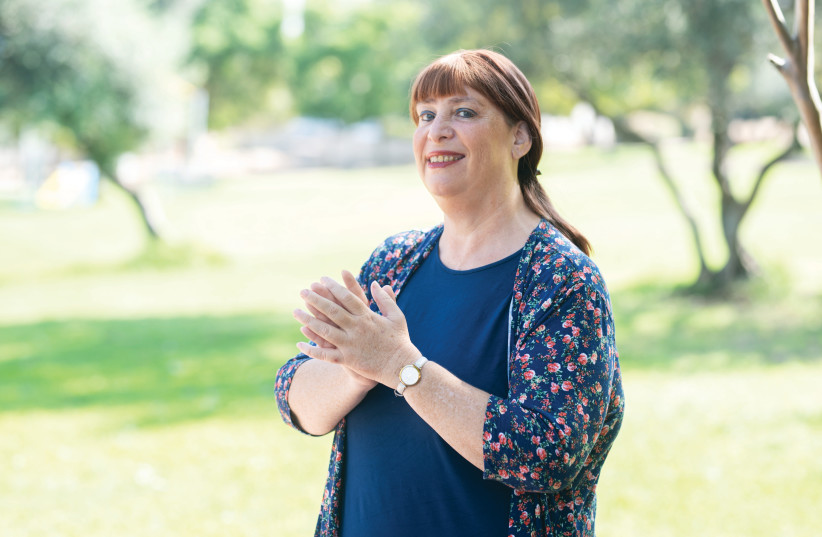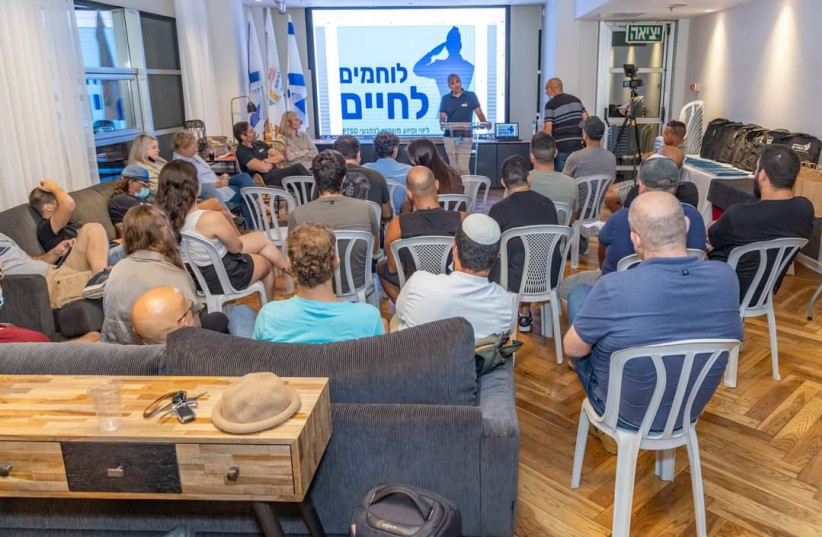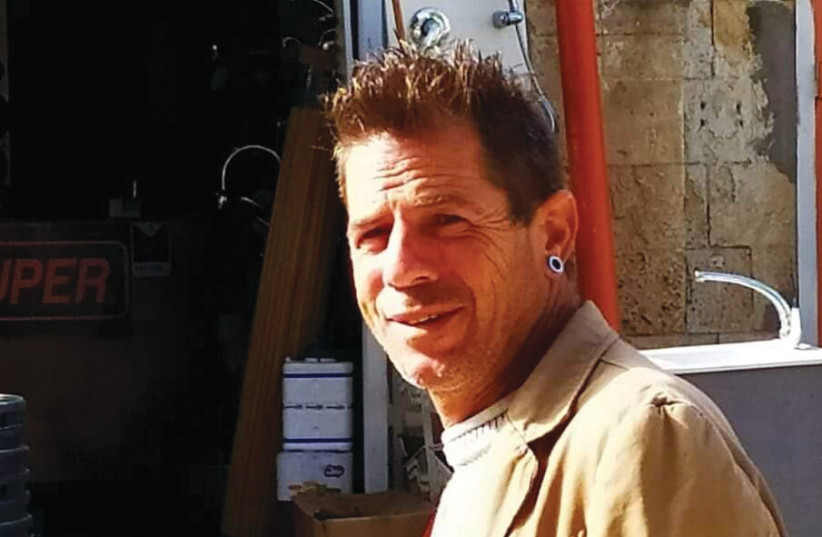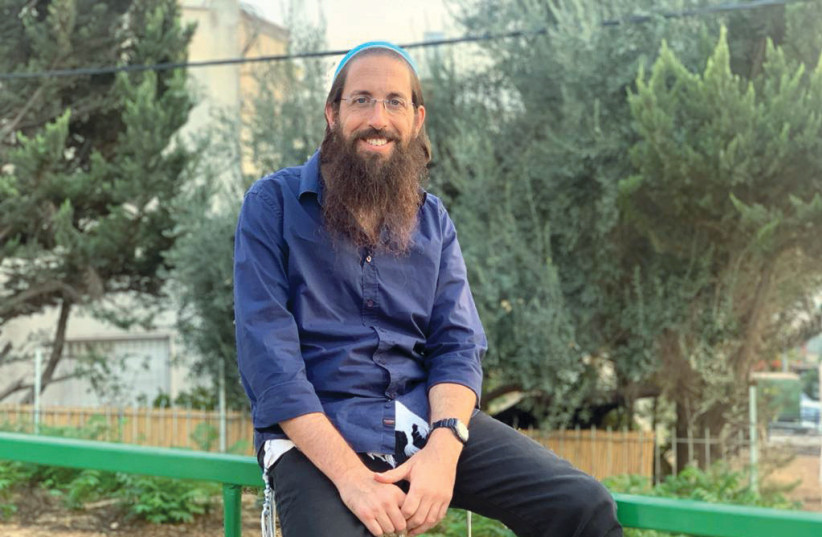What could be more powerful than being helped by those who have struggled with the same issues you face? Four people with mental illness open up and talk about nonprofits they founded to benefit others.
Lishma
Hadas Natan, the chair and co-founder of Lishma, has set a target for herself to promote the status of people with physical disabilities and mental illness. “From the moment we founded Lishma, our goal has been to offer the disabled a place to turn to for support,” Natan explains. “Our nonprofit is run by people with disabilities, which means that we understand exactly what difficulties people are dealing with.”
The name Lishma is a Hebrew acronym meaning it is an organization for integrating those coping with mental health and their empowerment.
“As a result of our own experiences,” Natan continues, “we have a better understanding of how to help them, and teach them how to take care of themselves. We assist people in creating structure, and in finding the appropriate resources that will enable them to become empowered as they get back on their feet.”

Natan’s struggle began 22 years ago at the age of 30 when she gave birth to her third child. “My third pregnancy was high-risk and I was receiving help from a social worker,” Natan recounts. “After I gave birth, I realized something was seriously wrong with me. I felt like I had no energy left, and I ended up spending most of my day in bed. I was finding it more and more difficult to get out of bed to take care of my small children.”
The social worker gave Natan a referral to a mental health clinic. “I was told I should stop breastfeeding so I could take psychiatric medication, which made me extremely sad. My mental state worsened, and I began self-harming, so I was hospitalized in a psych ward. They told me my baby wouldn’t be able to stay with me, and that made me even more depressed. I had to stay there for over a year, and then I was in and out for a few more years after that.”
How have you been feeling lately?
“A year ago, I had another episode, and so I had to go back into the hospital. It probably will never go away completely. But I’ve learned so much about the illness and about my situation, and as a result I’m better able to manage everything. So much so, in fact, that I am capable of helping others in similar situations. Unfortunately, not enough people are familiar with Lishma, so we are trying to rectify that.”
What is Lishma’s agenda?
“The board of directors is made up of people who themselves suffer from serious mental illness. In the past, it was considered normal for people who were diagnosed with chronic psychiatric conditions to be hospitalized and be considered people who needed to be protected. Lishma believes these people can be integrated into society and work in places such as psychiatric hospitals. We are endeavoring to slowly change society’s view of people about mental illness.
“We also help people who are suffering realize they are capable of holding down a job and contributing to their community. Our work is having an influence in the medical field; the people we work with are slowly feeling less like victims and are beginning to take charge of their lives.”
Lohamim Lahayim

Lohamim Lahayim (Fighters for Life) is a nonprofit that supports former IDF soldiers who suffer from shellshock or combat PTSD. It was founded in 2017 by Ido Gal Razon and Ben Goor Levy – former IDF combat soldiers injured during military service – who subsequently had difficulty in receiving approval for financial assistance from the Defense Ministry, for which they were eligible.
“It all began back in 2007, when I was serving as a soldier in Golani’s Unit 52,” recalls Gal Razon. “This was during the aftermath of the Second Lebanon War. In one skirmish, my partner was injured and died and I blamed myself for his death. In the next battle, I myself was injured when a grenade exploded next to me. Another soldier who was seriously injured and I were evacuated. I completed my military service in 2008 but these incidents still occupy my mind constantly.”
“I understood that something inside of me had changed; I had a hard time accepting that,” Gal Razon continues. “It took me time to realize that I needed professional help. I finally understood that my situation was not good; I had not been cognizant of the seriousness of my mental illness. So, when I began approaching the authorities to ask for psychological services, I got bogged down in an endless amount of bureaucracy and my case hadn’t advanced even after five years of submitting requests. During this time, my mental health seriously deteriorated.”
In November 2015, Gal Razon took part in a special Knesset session that dealt with the rights of IDF combat soldiers. “Following that experience, I founded Lohamim Lahayim to take advantage of the momentum and help other combat soldiers who were suffering.”
Were you successful in bringing about change?
“Absolutely. Lohamim Lahayim is extremely active and we’ve helped so many former soldiers suffering from combat PTSD receive the compensation they are entitled to. And we are currently assisting dozens of people.”
Do you feel like your work enables you to deal with your own personal mental health?
“Without a doubt. When you give something away, you get even more in return. For 11 years, the authorities refused to acknowledge that I had combat PTSD but when I boisterously told my story and made a stink in the Knesset session, all of a sudden they recognized my status. The only way to make progress is by making lots of noise – that’s where Lohamim Lahayim can help. There’s no reason each former combat soldier who is suffering from PTSD should have to go through this. We’re here to help them be on the fast track to receiving the services they deserve.”
Osim Nefashot
“You are incurable,” Omri Meridor was told by the medical staff at the psych ward where he was being treated. Meridor experienced a number of lengthy hospitalizations over the years due to mental illness. “This one sentence changed my life,” explains Meridor, who founded Osim Nefashot (Making Souls) three years ago. Meridor carried out his IDF service during the First Intifada. “I suffered from combat PTSD for many years before reaching out for help and getting treatment. Only when I began experiencing more serious manic-depressive episodes did I finally get help.

“I was in the hospital for an extended period of time, and then they finally offered up a diagnosis and stated I was incurable. As a result of this diagnosis, I was unable to find a job – everyone would just close their door in my face. I finally found help from Yozma Derech Halev (Initiative from the Heart). They provided me with assistance, guidance and helped get me a job. I was extremely lucky that the social worker believed in me and wrote me a recommendation, which I needed to get a job at a mental health clinic. That was a life-changing moment.
“Yozma Derech Halev provided me with the tools necessary to help others who are suffering from mental illness. I teach them how to turn their story and their experiences into tools. My first task was to plant a garden that would be taken care of by people suffering from mental illness.”
Meridor, who continues to work for Yozma Derech Halev, recently founded Osim Nefashot, which already has thousands of members and was created to provide information about a wide array of subjects connected to mental health and rehabilitation, in an effort to shatter the stigma. “There is a great lack of sensitivity and knowledge surrounding this subject,” Meridor asserts. “The goal of Osim Nefashot is to encourage constructive discourse. Our community is a wonderful mix of professionals, people who suffer themselves from mental illness, their family members and other people who are interested in the field.”
What are your future plans for Osim Nefashot?
“Well, we began as a Facebook group. Then, COVID-19 hit, and we began meeting virtually outside of Facebook. Now, we are working with the health plans to form in-person sessions. Our goal is to reach as many people as possible.”
Soteria House
In 2005, when Israel unilaterally disengaged from the Gaza Strip, Avremi Fridlander was newly married and living in Gush Katif. “Those were extremely stressful times, and I was exceptionally worried and anxious about the prospects of losing my home and being uprooted,” Fridlander describes. “I began intensively studying Kabbalah and I achieved a very intense spiritual feeling that was accompanied by irrational thinking.”

Can you describe this feeling?
“I began thinking I knew when the Messiah would come and when the Holy Temple would be rebuilt. I saw things that hadn’t actually happened, and I thought I knew what every person would be reincarnated as. One time when I was at the Kotel, I made a vow to myself that I would lie down on the stones there and not move until the Messiah came.”
“Finally, somebody called for the paramedics, and I was brought to the emergency room. Since they couldn’t find any physical maladies, I was hospitalized in the psych ward,” Fridlander explains. “My anxiety was sky high, and I was categorized as having catatonic psychosis.”
With encouragement from the director of the Division of Men’s Psychiatry of Herzog Hospital, Prof. Pesach Lichtenberg, Fridlander’s condition slowly improved. “I began communicating again, and Prof. Lichtenberg refused to give up on me. Despite my clinical presentation, he continued to interact with me as if I were a normal person, and this was what helped me heal.
“Later on, I successfully completed a bachelor’s degree in psychology and began volunteering in the same psych ward in which I’d spent so much time as an inpatient. I realized that the people hospitalized there were suffering the same way I had just a few years before.”
Lichtenberg was so impressed with Fridlander’s work that he suggested they cofound Soteria House, a nonprofit that espouses a holistic worldview, seeing all human beings as worthy of respect. Soteria House offers patients the support of a warm, safe and respectful environment within the community.
“I thought this was a brilliant idea and I jumped at the opportunity,” Fridlander says. “If there had been such an option when I’d been hospitalized, I think I would have improved much quicker. Living in a hospital is not conducive to improving your mental health.
“At Soteria House, we have staff who are supportive, know how to listen, and are trained in ‘being with’ clients to help them through difficult times. In 2016, I was appointed director of the organization and I am also a board member and one of the psychologists who help residents.”
What is Soteria House’s main goal?
“Our aim is to treat people suffering from mental illness as normative individuals dealing with temporarily difficult conditions. We don’t treat symptoms – we look our residents in the eye and engage with them as one human being to another.”
Translated by Hannah Hochner.
